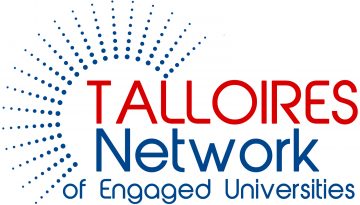Updated Messaging for the Talloires Network of Engaged Universities
As the Talloires Network of Engaged Universities celebrates its 15th anniversary with a new name and a new logo, it deserves a new messaging philosophy that more accurately reflects its new initiatives to build and support the university civic engagement movement.
A reevaluation of the Network’s outward-facing identity reached beyond correcting the areas of the website which were outdated: It included a revitalization of the language the Network uses to describe its mission, vision, values, and goals. It is only by reexamining our messaging on an ongoing basis that we can actively make our work and its presentation as equitable and inclusive as possible.

By updating our messaging framework, both on the website and throughout our materials going forward, the language we use to describe the Network will be more in line with our practices. While the language on the website may have been well-suited to the Talloires Network’s vision a few years ago, recent developments in our work, the field of civic engagement, and the world as a whole demand that we update this messaging so as to best represent our work today. At the same time, the Network must not abandon its founding spirit and defining attributes. An international focus, the involvement of university leaders ascivic engagement leaders, a belief in the power of building relationships between institutions of higher education, and an emphasis on collective action are just a few of the characteristics which are essential to the past, present, and future of the Network.
Since the university civic engagement movement is a relatively new phenomenon, its underpinning logic is not universally accepted and understood. We recognize and celebrate the diversity of ethical approaches to university civic engagement, supporting engagement in all its forms including community-based research, applied research, service-learning, experiential learning, extension, volunteerism, public service, policymaking, social entrepreneurship, and political activism. The definition acknowledges, for example, that standards about the validity of activism in academic institutions are rapidly evolving. The Network takes the position that racial justice is not a political issue but a human rights issue. Some of our members may view justice movements at higher education institutions as political, but that does not make them unworthy of attention from a scholarly perspective. The Network will talk about justice without engaging in partisan battles.
A final recent development that warrants consideration when reimagining the Network’s branding is our mutual (re)discovery of possibility in moments of crisis. This development, though shared with the rest of the world struggling with the coronavirus pandemic right now, is less of a sea change in the civic engagement field and more of a shift within our own work. When the COV-AID program ends, and when the pandemic eventually ends, there are takeaways from the effort that can influence the direction of the Network going forward. For example, building from COV-AID, we can highlight the potential for engagement programs to improve from the baseline, even and especially in the face of crisis. The coronavirus pandemic has proven that extreme adversity provides fertile ground for innovations with effects that will reverberate long after the conclusion of the immediate emergency. Imbuing this part of our messaging with hope — hope not just of recovery but of resilience and reform — will help us frame the university civic engagement movement in terms of potential, affirmation, and shared purpose.
We offer our new messaging framework to illuminate the benefits of university civic engagement to all parties more clearly, facilitating the addition of enthusiastic signatory members and engaged members to our community. We encourage our members to invite others to join the global university civic engagement movement.
Sincerely,
Anthony P. Monaco
President, Tufts University